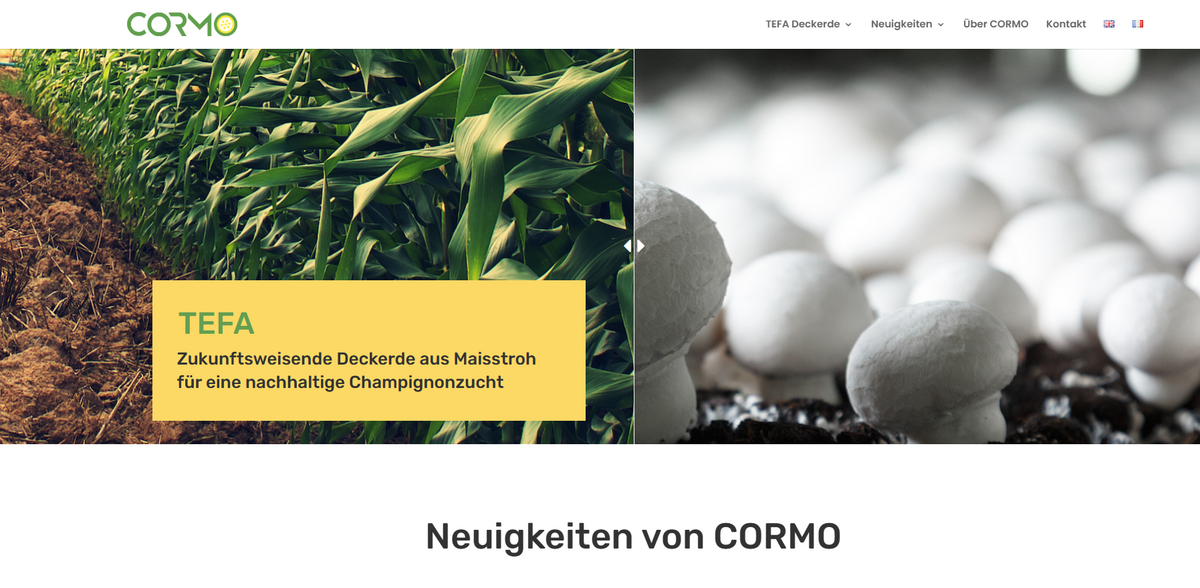What the Project Is
CORMO produces peat-free substrate from corn straw for sustainable mushroom cultivation. CORMO has developed a completely new technology for utilizing corn stalks. A part of the plant is processed into TEFA, a peat-like fiber material with very low nutrient content. The technological processing allows control over fiber length, pore size, nutrient and salt content, structural stability, biological activity, and stickiness. Another part of the plant is processed into BABS, a 3-dimensional granulate with extremely high water retention capacity. Due to its low density and fine porosity, BABS combines properties of expanded polystyrene, activated carbon, and superabsorbents (SAP), but is simultaneously a pure and 100% biodegradable natural product. CORMO’s technology is patented and includes industrial solutions for raw material harvesting, processing, as well as quality management and control. In addition, CORMO holds the rights to scientific validations of specific applications and possesses industry-specific application know-how. An office and production facility are located in St. Aubin (Fribourg, CH), making this a robust industrial solution with a regional connection.
Main Benefit
- Replaces 3.5 million m³ of black peat annually used in European mushroom and vegetable production.
- Enables a reduction of up to 90% in CO2 emissions by substituting black peat.
- Delivers up to a 10% additional yield in multi-year trials with excellent mushroom quality.
- Utilizes corn stalks—an otherwise unused byproduct of the grain corn harvest—offering a sustainable raw material solution.
- Employs a patented, precision-engineered technology that paves the way for custom-made products in industrial applications.
Innovative Technology
CORMO’s breakthrough lies in the dual-platform approach of TEFA and BABS. With a keen eye on innovation, the process allows precise control over the processing parameters. This means that fiber length, pore size, and even stickiness can be managed to suit specific industrial needs… It also paves the way for tailored products developed over years of targeted research and development. TEFA stands out as the first sustainable substitute for black peat, marking a significant leap in sustainable practices.
Sustainable Raw Material
The raw material used by CORMO, corn stalks, is a byproduct of the grain corn harvest. The typical fate of corn straw is less than ideal—it is not storable after harvest due to its high moisture content, has very low feed value, and is hardly suitable as fuel owing to its high potassium content. Instead of letting this valuable resource go to waste and remain as harvest residue in the field, the technology harnesses it, offering a fully sustainable solution. This method not only valorizes an otherwise unused product but also opens up a new income opportunity for corn producers.
Enhanced Crop Yields
TEFA substrate has shown, in multi-year trials by renowned institutions, an additional yield of up to 10% compared to black peat substrate, all while maintaining excellent quality of the mushrooms. Such improved performance means higher productivity in mushroom cultivation—a critical factor for the industry. The fact that this improvement comes with a sustainable substrate alternative adds an appealing twist. It’s like getting more bang for the buck, with the added satisfaction of contributing to environmental conservation.
Project Impact on SDGs
- SDG 9: Industry, Innovation, and Infrastructure – By utilizing a patented, precision-engineered technology for sustainable processing.
- SDG 12: Responsible Consumption and Production – Through the use of an otherwise discarded byproduct, corn straw, in lieu of non-renewable resources like black peat.
- SDG 13: Climate Action – Achieving reductions of up to 90% in CO2 emissions by substituting fossil-based raw materials.
- SDG 15: Life on Land – Enhancing sustainable agricultural practices and reducing environmental degradation.
Market Opportunity
Due to its low density and fine porosity, BABS natural foam combines the properties of expanded polystyrene, activated carbon, and superabsorbents in one 100% biodegradable package. The possibilities are exciting—a product that is both innovative and environmentally friendly. TEFA substrate, as the first sustainable substitute for black peat, can be produced regionally in consumer markets. Unlike black peat, which must be mined centrally and transported over vast distances, TEFA can be produced closer to the customer, reducing logistics and the carbon footprint involved. This not only makes the product attractive for customers and investors but also positions it as a game changer in sustainable industrial applications. The integration of these advanced materials in mushroom cultivation and other industries signals a bright future where innovation meets environmental stewardship.


















